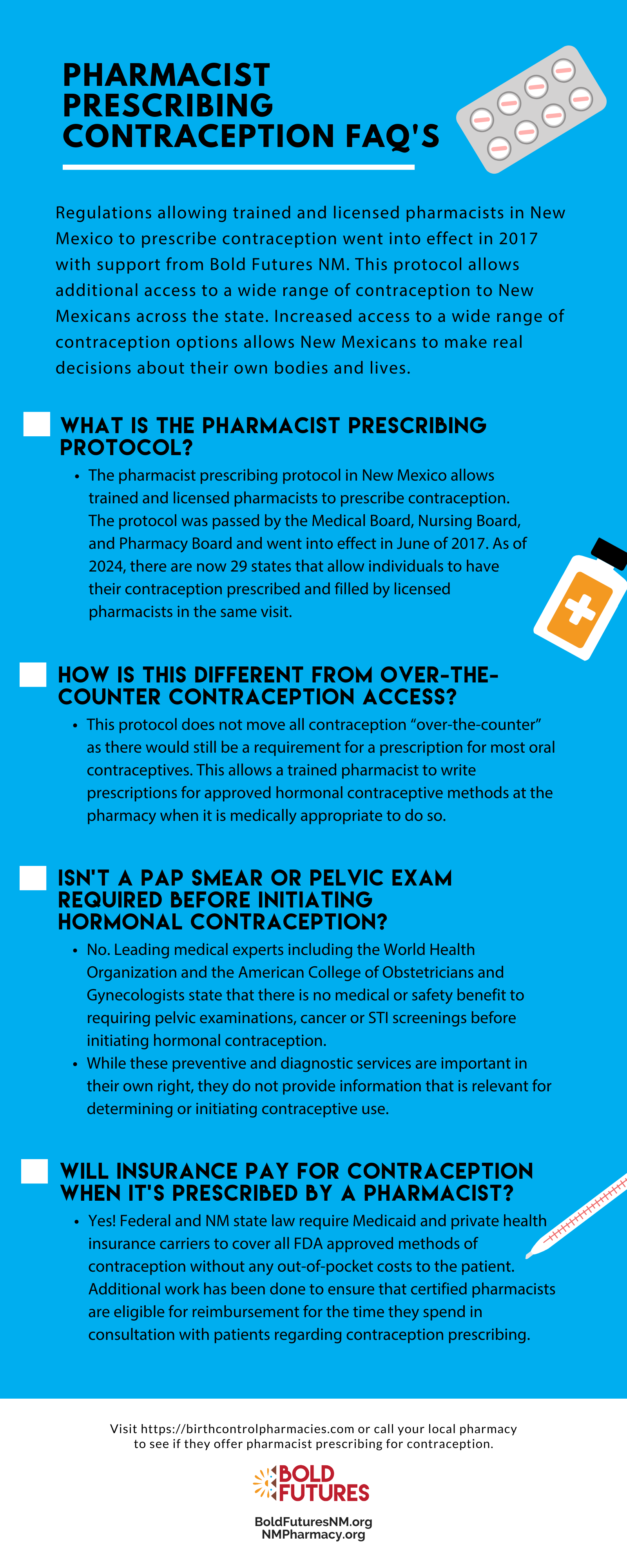Access to Contraception in New Mexico
Did you know pharmacists can prescribe hormonal contraception in New Mexico?
Regulations allowing trained and licensed pharmacists in New Mexico to prescribe contraception went into effect in 2017 with support from Bold Futures NM. This protocol allows additional access to a wide range of contraception to New Mexicans across the state. Bold Futures NM is proud to have been part of recent work done nationwide to have the first progestin-only birth control pill released for over-the-counter purchase. Increased access to a wide range of contraception options allows New Mexicans to make real decisions about their own bodies and lives.
WHAT IS THE PHARMACIST PRESCRIBING CONTRACEPTION FAQ'S?
The pharmacist prescribing protocol in New Mexico allows trained and licensed pharmacists to prescribe contraception. The protocol was passed by the Medical Board, Nursing Board, and Pharmacy Board and went into effect in June of 2017. As of 2024, there are now 29 states that allow individuals to have their contraception prescribed and filled by licensed pharmacists in the same visit.
HOW IS THIS DIFFERENT FROM OVER-THE-COUNTER CONTRACEPTION ACCESS?
This protocol does not move all contraception “over-the-counter” as there would still be a requirement for a prescription for most oral contraceptives. This allows a trained pharmacist to write prescriptions for approved hormonal contraceptive methods at the pharmacy when it is medically appropriate to do so.
ISN’T A PAP SMEAR OR PELVIC EXAM REQUIRED BEFORE INITIATING HORMONAL CONTRACEPTION?
No. Leading medical experts including the World Health Organization and the American College of Obstetricians and Gynecologists state that there is no medical or safety benefit to requiring pelvic examinations, cancer or STI screenings before initiating hormonal contraception. While these preventive and diagnostic services are important in their own right, they do not provide information that is relevant for determining or initiating contraceptive use.
WILL INSURANCE PAY FOR CONTRACEPTION WHEN IT’S PRESCRIBED BY A PHARMACIST?
Yes! Federal and NM state law require Medicaid and private health insurance carriers to cover all FDA approved methods of contraception without any out-of-pocket costs to the patient. Additional work has been done to ensure that certified pharmacists are eligible for reimbursement for the time they spend in consultation with patients regarding contraception prescribing.
Visit https://birthcontrolpharmacies.com or call your local pharmacy to see if they offer pharmacist prescribing for contraception.
ARE THERE PRIVATE AREAS TO COUNSEL PATIENTS WITHIN BUSY PHARMACIES?
Many pharmacies are already engaging in activities such as administration of vaccines and therefore have private consultation areas where conversation and counseling can take place. Notably, the physical examination requirements for this prescription protocol are limited to a blood pressure measurement. Therefore, current measures to ensure confidentiality are satisfactory. In-depth and detailed conversations regularly occur in pharmacy settings and pharmacists are trained to handle these sensitive and confidential conversations. Sometimes, if a patient is too embarrassed or unwilling to schedule a formal appointment, the counter is the only place where the patient feels comfortable to have such a conversation.
WILL THIS CAUSE A RISE IN THE RATES OF STIS?
STIs education/counseling is an essential requirement in the certification and training process for pharmacists that decide to prescribe contraception.
WILL THIS PROTOCOL KEEP PATIENTS FROM ACCESSING LONG-ACTING METHODS, LIKE IUDS?
No. The protocol actually requires pharmacists to provide resources and referrals to patients requesting more information or access to LARC methods. It is important to remember that long-acting reversible methods are not right for everyone. Standards of care require that family planning be patient-centered and responsive to individual preferences, needs, and values.
WON'T PATIENTS STOP GOING TO A DOCTOR FOR IMPORTANT PREVENTIVE HEALTHCARE IF THEY'RE ABLE TO GET THEIR BIRTH CONTROL SOMEWHERE ELSE?
Research suggests that individuals continue to see their health care providers for other preventive services at high rates even when they are able to access contraception through the pharmacy. (Hopkins K, Grossman D, White K, Amastae J, Potter JE. Reproductive health preventive screening among clinic vs. over-the-counter oral contraceptive users. Contraception. 2012; 86(4): 376-82.) Furthermore, requiring individuals to receive unrelated services in order to obtain contraception raises ethical concerns and creates harmful barriers to care.
WILL THIS ELIMINATE PHYSICIANS’ AND OTHER PROVIDERS’ ROLES IN PROVIDING FAMILY PLANNING CARE?
No, physicians (and other providers with prescriptive authority) will continue to play a critical role in patients’ reproductive and general healthcare. The protocol requires pharmacists to refer patients to their primary care providers or a local clinic if they have medical risk factors that make them ineligible under the protocol, are experiencing side effects, or are seeking methods not provided at a pharmacy. Pharmacy access to contraception allows pharmacists an opportunity to engage patients and provide them with information about the importance of other preventive health care and referrals to local providers.




